Sigh Of Relief As PHASE Constructs Shallow Water-Wells In Maracha District
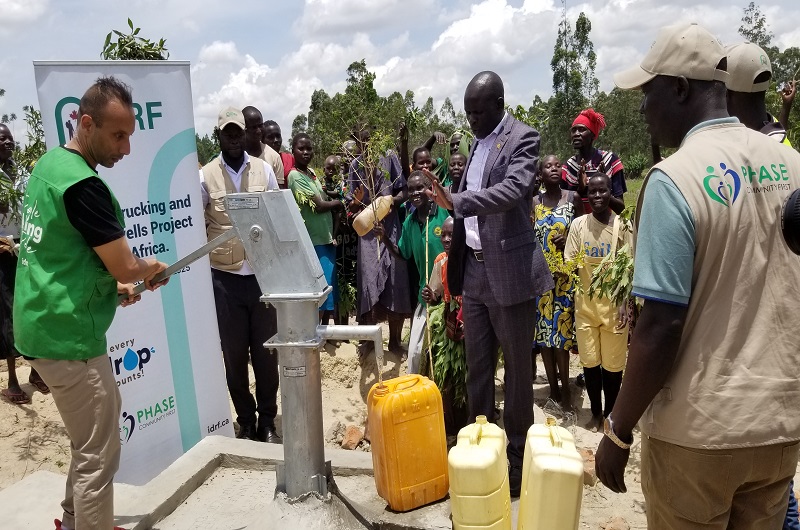
The newly constructed water source in Aligo village, Drambu sub-county. Photo Credit, Andrew Cohen Amvesi
MARACHA. Lack of clean and safe water poses severe health risks, leading to waterborne diseases, malnutrition and stunted growth, particularly affecting children, and perpetuates a cycle of poverty.
These challenges are not any different in Maracha district which was carved out of Arua in 2010.
Maracha district, with a population of 234,892 people has a safe water coverage of 76 percent, with rural areas at 77 percent and urban areas at 73 percent.
The district has a total of 934 domestic water points serving the ever-growing population of which, 210 are non-functional, according to the 2024 Uganda Bureau of Statistics (UBOS) report.
But despite the glaring safe water coverage at the district level, Samson Anguzu, the Maracha Town Council Assistant Water Officer, noted that currently, the water coverage for Maracha Town Council alone, in Maracha East County stands at 40.2 percent.
He said whenever they go for assessments, water issues come up but the government always gives them the least attention.
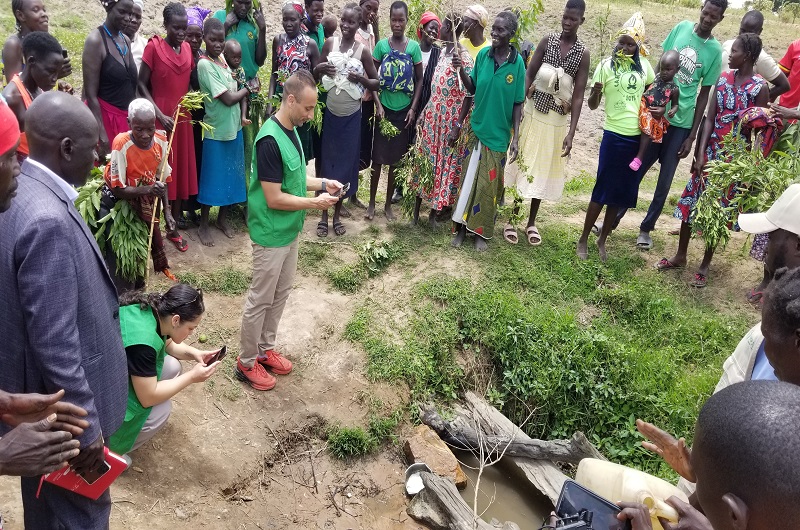
However, this gap is now slowly being closed with the coming of Pragmatic Help Achieving Social Empowerment (PHASE), an International Nongovernmental Organization (NGO).
PHASE has embarked on the construction of shallow water wells in Maracha East County with funding from International Development and Relief Foundation (iDRF), founded in Canada in 1984.
The shallow water wells constructed in all the sub-counties of Maracha East are an ultimate savior for the people who have for long been grappling with the problem of inadequate access to clean and safe water in the area.
At least 9 shallow water wells were constructed across Maracha East County in the first phase of the water project in 2024.
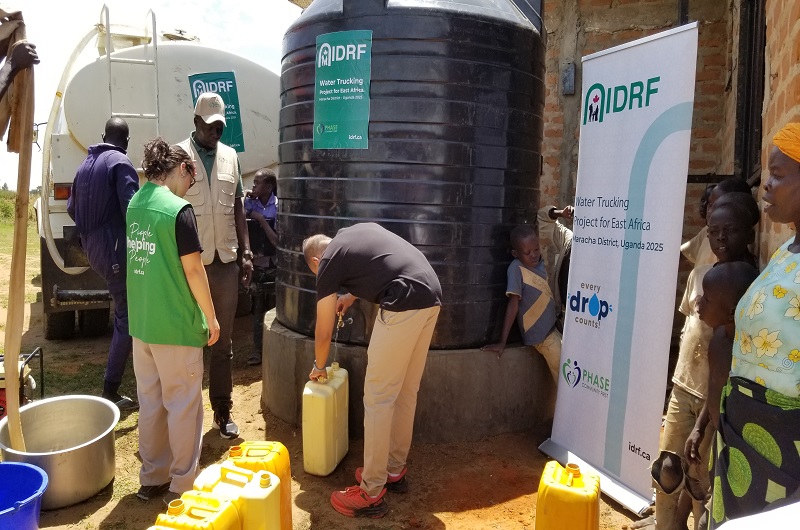
Meanwhile in February this year, another round of constructing 15 more shallow water wells was launched by PHASE to address the challenge of water scarcity in Maracha East.
The project, according to PHASE officials, focused on Maracha East because it didn’t benefit from the piped water supply system of the Ministry of Water and Environment.
The piped water project is currenting serving the people of Maracha County, a reason PHASE came in to save the people of Maracha East County before it is too late.
Registered in 2014 in Somalia, PHASE Organization operates in three East African Countries of Somalia, Kenya and Uganda with main focus on health, education and socio-economic wellbeing of the people.
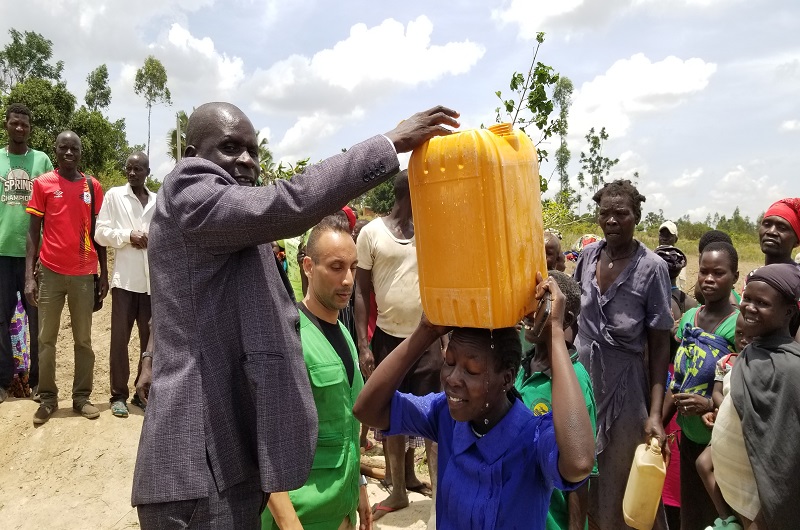
Justus Yeero Aduma, one of the Directors of PHASE in Uganda, said some of the sub-counties in Maracha East with grave water challenges have this time round, got two shallow water wells while those that have fairly good water coverage got one each.
“We will keep changing this from time to time. As you know, water is really a very big problem in the entire Maracha district because many villages don’t have access to safe and clean water. So, we are happy that our partners are able to support this project for our people to have improved access to safe and clean water,” said Aduma, who doubles as the programs and technical manager for PHASE covering Uganda, Kenya and Somalia.
He assured the public that the quality of the shallow water wells they have constructed is so good as per the tests conducted by water experts.
Similarly, Aduma said they have procured and supplied 5000-litre capacity water trucking tanks to institutions like churches and schools especially in the Town Councils to also help the communities in the catchment areas.
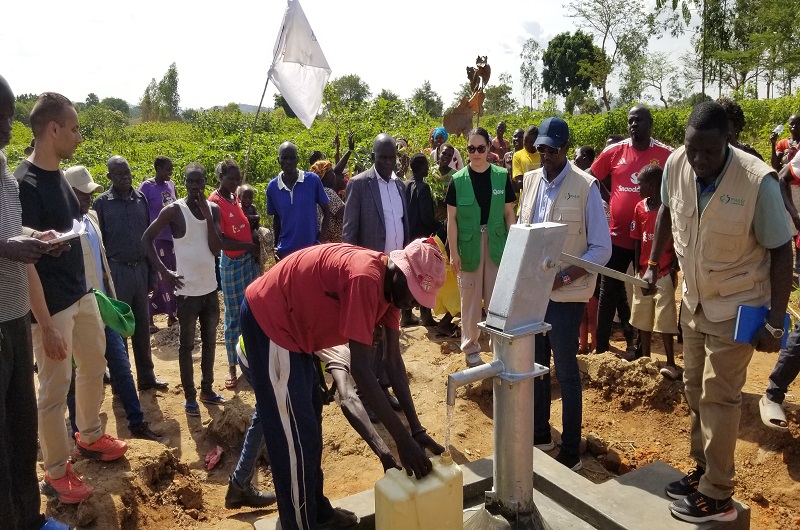
This is additional to the food PHASE donated to vulnerable elders living in Maracha district to also help them live a fairly good life.
While inspecting the completed water projects in Maracha this week, Dr. Muhammad Abukar, the Executive Director of PHASE, said they are happy to see locals so excited about the projects implemented by PHASE in the district.
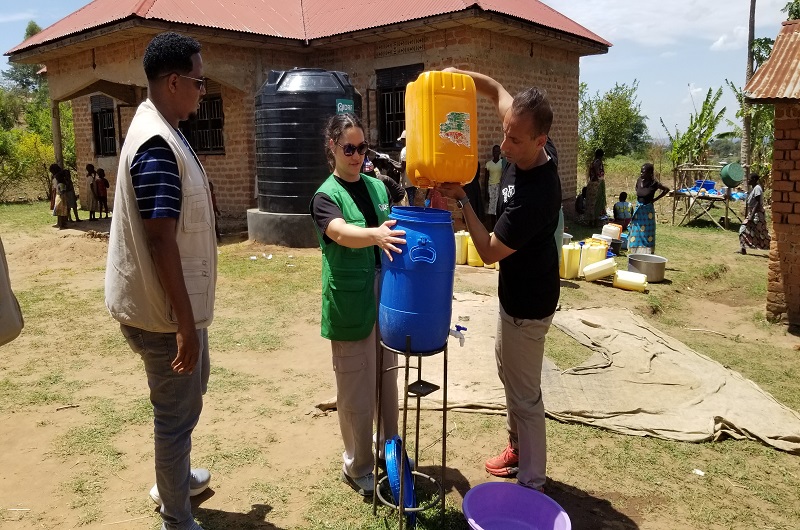
He, however, appealed to the locals to own the projects by taking good care of the projects so that they would be able to last for a long period of time.
Dr. Abukar said having noticed the continued high demand for services in the district, PHASE will go back and still appeal to donors to consider extending more funds to support the needy people in the district.
Locals speak out
The PHASE water projects have generally caused a lot of excitement among the people of Maracha district with many saying they are now saved from the burden of waterborne diseases and trekking long distances in search of clean and safe water among other challenges.
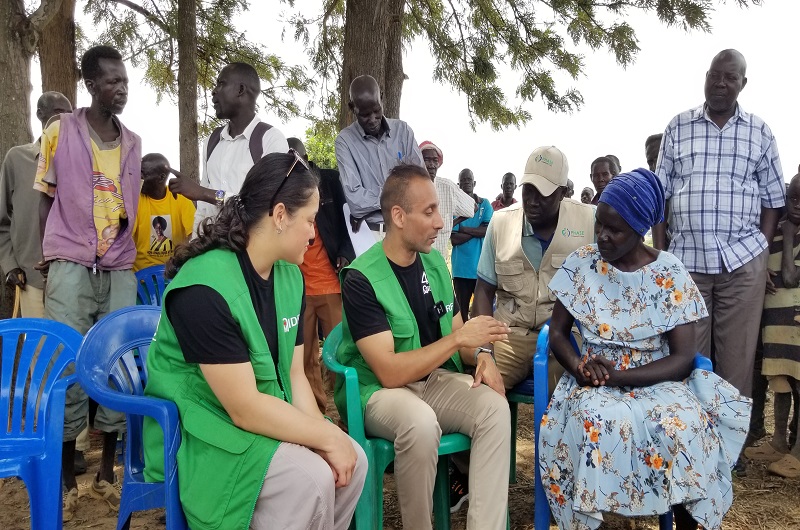
Grace Aziyo, a resident of Oleko village, Baria Parish in Nyadri sub-county, expressed happiness to PHASE and iDRF for sinking a shallow water well in their village.
She said the women in the area usually wake up at 3:00am to go and look for water, leaving their husbands and children in the house alone.
“It takes us more than 4 hours to get water and by the time you reach home, it is already morning, so we don’t get time to make love with our husbands. Sometimes, our husbands get annoyed with us thinking that we are out there with other men. This has resulted in domestic violence and divorce in some homes. So, when you bring water closer to our doors like this, we greatly thank God for this opportunity,” Aziyo said.
Irene Draru, a resident of Edogoa village, Etoko Parish in Paranga sub-county, also thanked God for bringing PHASE to their rescue.
Draru noted that for years, they have been drawing water from the only boreholes at Paranga and Etoko primary schools which are about 3 to 4km away from their village thus causing unnecessary delays in getting water for home use.
“We sometimes resort to fetching water from contaminated sources like streams in case one can’t make it to the boreholes, aware that animals also rely on the same water from the stream or river. Today, I’m very happy that God heard our prayers through PHASE to have this water source in our village,” Draru said.
Draru was quickly supported by Jesca Angucia, the Edogoa village chairperson, who said the shallow water well they have received will help in reducing the rate of sickness in her village.
According to Angucia, Edogoa village has so many cases of stomach pain, bilharzia and typhoid among others which are as a result of drinking dirty water.
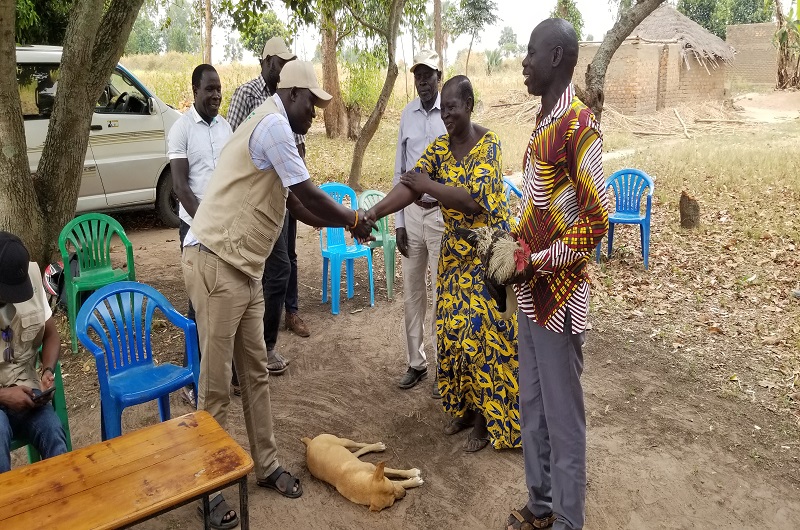
“Now that PHASE has constructed for us a clean source of water, the people in my village are the happiest because they are going to start saving the money they were using for treatment to now pay their children’s school fees and buy food at home. For that reason, I’m so grateful to PHASE and iDRF,” Angucia said before handing over a Cock to Aduma in appreciation.
Emily Letasi, the head teacher of St. Mary and Joseph Nursery and Primary school in Maracha Town Council, said their pupils used to move to people’s neighboring homes to beg for drinking water during lunch time but now with the water trucking tank they have received from PHASE, the problem of water in the school is now solved.
She instead urged PHASE to consider constructing some classrooms for the school to reduce the congestion in classes.
David Amayo, another resident of Gbongo village on the hilly sides of Yivu sub-county, said the only water spring they have in the village usually dries up during the dry season.
He said whenever there is no water in the spring, children and women in the village trek for more than 6km in search of clean water.
“Because of this, children end up going to school late while women are delayed in doing their domestic chores. So, I’m happy that we have got this shallow water well which has come as an alternative to the water spring we have in our village,” Amayo said.
Local leaders’ take
Hajji Ramadhan Walugembe, the Maracha Resident District Commissioner (RDC), applauded PHASE for complementing the effort of the government in ensuring that everybody has access to clean and safe water in the district.
Walugembe noted that one of the challenges of the West Nile sub-region is water.
“When I was coming here, I saw one borehole with a very long line as if it was a line of cattle going to the well but full of jerrycans. That is already an indicator that we have that challenge of water. When Aduma comes and brings people from PHASE to help us, it is a supplement to the government because it is the government that is supposed to provide the essentials to the communities,” Walugembe said.
“But the government at times gets stressed and it is not in position to cover everything at the same time. So, when we get friends like PHASE to come here and supplement our effort by providing water to the people, they deserve our support,” Walugembe stressed.
Stephen Obitre, the Maracha district chairperson, observed that on average, they receive funds from the central government for drilling at most six boreholes per year, making it very difficult to divide and allocate the water sources for the 691 villages in the 19 sub-counties and town councils of the district.
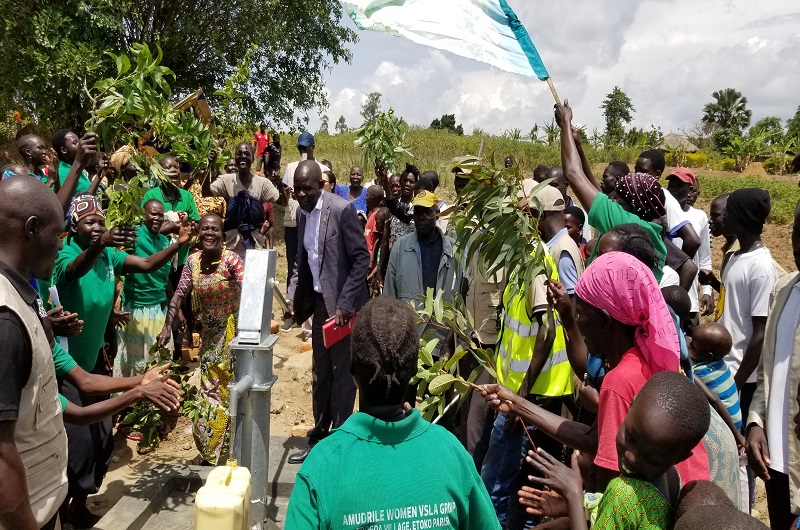
“If we were to move on our own as a government, we would not be able to get water for all these villages at the right time. So, when we get such kinds of water facilities, we really praise God and thank the partners so much for this initiative,” Obitre said.
According to Obitre, the ideal situation of safe water coverage in Maracha district doesn’t exceed 60 percent if water sources that outlived their usefulness were to be removed from the district database.
“We still have a lot of people who have no access to safe and clean water in the district. Some of those water facilities which still appear in the data-base of the district are no more, they have dried up; the boreholes have dried up, the springs that were constructed have dried up, even some shallow wells constructed those days have dried up but still they are reflected in the data-base. That is why we see our safe water coverage is high yet on ground, people are suffering,” Obitre said.
Similarly, Godfrey Osutre, the Paranga sub-county chairperson, acknowledged that he has water problems in the 51 villages in his sub-county.
“In these 51 villages, we have 18 boreholes which are functional while others are actually non-functional, they need to be decommissioned. We have given data to the district about them but we have not got any response yet. Today, it is a good opportunity in Paranga sub-county, Etoko parish in Edogoa village because we have received blessings with water where PHASE has dug for us a shallow water well to help this community which has been suffering for long without clean water,” Osutre said.
He added that: “Take for example from Liko up to Nigo along this area there is no borehole. So, this is timely and the communities have appreciated it as you have witnessed.”
Rev. Denis Adoroti, the Anglican Parish Priest of Bura Church of Uganda in Maracha Town Council, said the wellbeing of people depends on water because water is life.
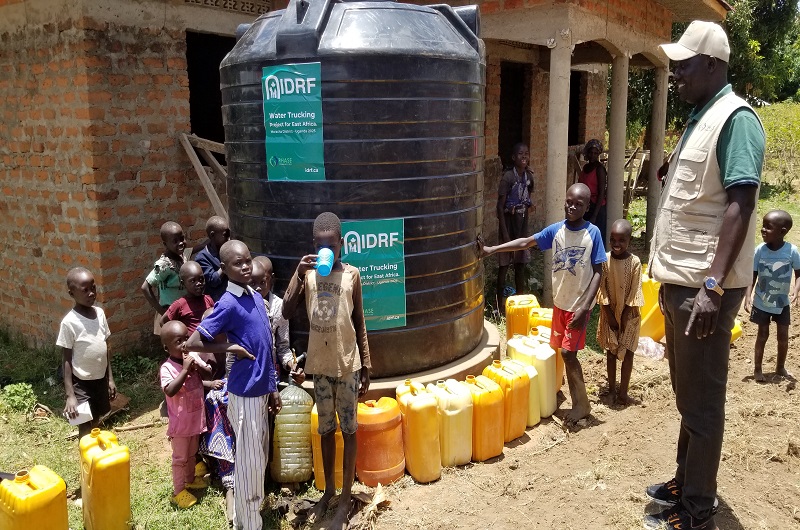
He appreciated PHASE for bringing water closer to the people who have been suffering for all this long.
Adoroti who received a 1,000-litre capacity tank at his church to track water for the surrounding community under the water trucking project for East Africa being implemented by PHASE, testified that he used to fetch water from far using his motorcycle for his family.
Adoroti said in a day, he would fetch 20 jerrycans of water for his family to use for about two to three days before going for more.
He thanked PHASE and iDRF for coming to save his family and the community around that used to suffer a lot when it comes to access to clean and safe water.
Adoroti, however, requested the government of Uganda to change its policy to allow boreholes and shallow water wells to be dug in town areas.
“The government policy says in Town Councils, Municipalities and Cities, there should be no boreholes and shallow water wells apart from piped water. But we who are in the town council, we are sincerely struggling to get clean water. The issue of water is a challenge in the town council but these people are following the government policy which is in turn affecting the ordinary people. My prayer is that let this policy be amended so that the people in towns can also benefit from such initiatives brought by PHASE and iDRF,” Adoroti said.
Donor’s message
In his assessment of the completed projects, Elyas Burney, the Director of Global Programs and Social Impact, who doubles as one of PHASE funders under iDRF, said he was touched by the testimony of women who walk through the dark for hours in search of water.
Burney said now that water has come closer to the women, he is happy that they no longer need to walk longer distances in search of clean water.
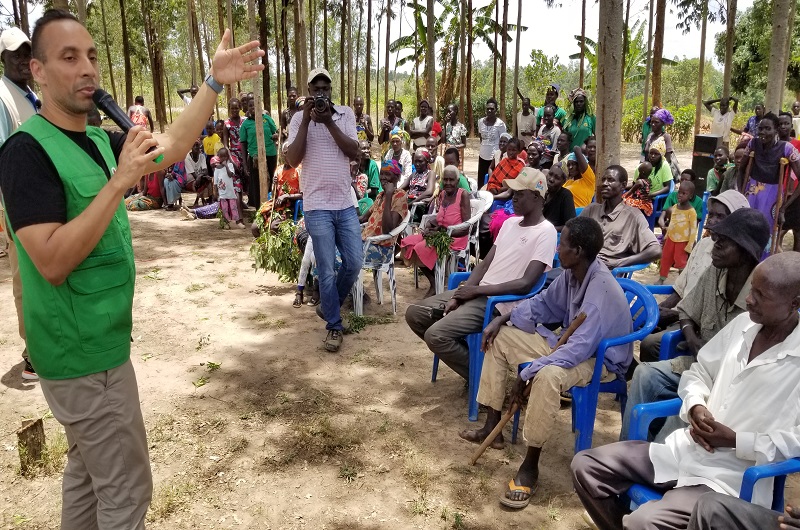
“I want to thank all our donors that have contributed funds to prioritize communities like this one in Uganda to ensure that people have clean water every day,” said Burney, who traveled all the way from Canada in the company of Rebecca to commission the different projects they funded in Maracha district.
The health perspective of water
According to Dr. Paul Onzubo, the Maracha District Health Officer (DHO), the human body is composed of 40 litres of water.
He said the body is filled with water in the bones, skin, various organs and in the cells which are the smallest unit of the body.
“That is why when you lose a little bit of water, it is called dehydration and you will see how somebody collapses, and the effect is felt more on children, pregnant women and also the elderly people,” Onzubo explained.
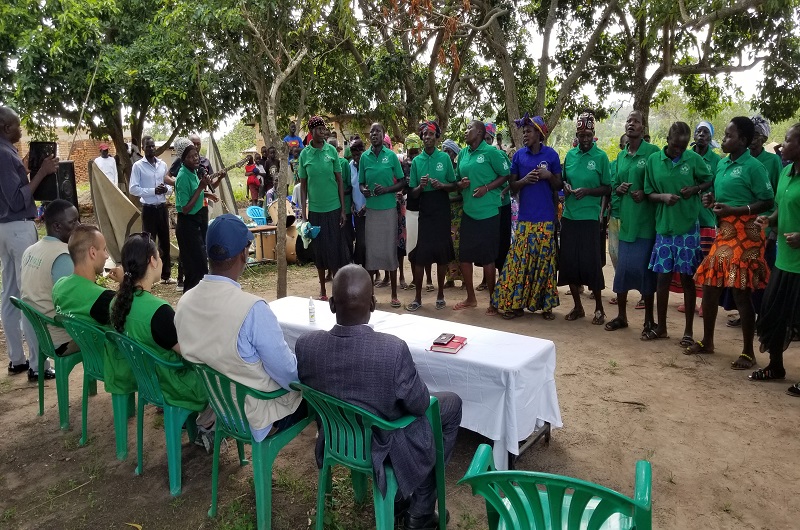
Meanwhile he said those days, the burden of water borne diseases used to be seen in diarrhea – meaning water is for hand washing, bathing and washing many other things.
“That is where personal hygiene comes in. So, where there is water inadequacy in an area, you will know that personal hygiene goes down and that is when people will start stinking, you will think it is the mouth when it is the feet or it is the pants, a lot of it… that is water from the surface. So, people will suffer from various diseases,” Onzubo remarked.
He said recently they analyzed data from one of the regional referral hospitals in West Nile, and found out that most of the challenges people present at the out-patient department (OPD) arise from poor personal hygiene thus signifying how important water is in the communities.